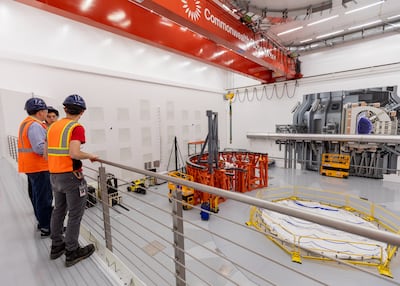Britain's fusion energy development, which could lead to an almost limitless supply of clean energy, is to receive a £410 million investment boost from the UK government.
The investment will be used to accelerate the development of the UK's fusion sector over the next two years, and is aimed at attracting and training more scientists, engineers, welders and programme managers into the industry. Fusion supports at least 2,400 jobs already in the UK, with thousands more to follow as the technology advances.
Several companies have been shortlisted by UK Industrial Fusion Solutions (UKIFS) to construct a world-leading fusion power plant in Nottinghamshire, which was once a major centre of Britain's coal industry. Indeed, the prototype plant is set to be built at the former site of a coal power plant, with the aim of revitalising the area with new, skilled jobs.
“Britain is at the forefront of this global race to deliver fusion, and today’s record level of funding will provide investment and economic growth through our Plan for Change, delivering on net zero and creating the clean energy of the future,” Energy Secretary Ed Miliband said.
Global race
Fusion involves the collision of lighter atoms to create a heavier one, a process that happens in the Sun when atoms of hydrogen smash into each other to create atoms of helium, in the process releasing huge amounts of energy. It is distinct from fission, the process used in nuclear power plants where heavier atoms are split to release energy.
“We are taking a step forward in the global race to commercialise fusion, growing our economy, attracting investment and harnessing the power of the Sun to create clean limitless secure energy,” Climate Minister Kerry McCarthy said. “This is what our clean energy transition is about – creating jobs in our local communities and building the skills that we need on the path to net zero.”
The path towards building a commercially viable fusion plant, known as Step (Spherical Tokamak for Energy Production), is led by UK Industrial Fusion Solutions (UKIFS), a wholly owned subsidiary of the UK Atomic Energy Authority (UKAEA) Group. From the shortlisted companies, one engineering and one construction firm will eventually be awarded contracts worth hundreds of millions of pounds to bring a fusion plant online and make the power a commercial reality.
Tokamak Energy and Westinghouse are among the engineering companies, and Balfour Beatty and Vinci Construction are in the running for the construction contract. The companies and several others will undertake detailed discussions with UKIFS before the final contracts are awarded.
“It is great to see the level of investment and support from the UK government announced this morning,” Warrick Matthews, chief executive of Tokamak Energy, told The National. “It also confirmed Tokamak Energy and our Celestial partners progressing to the next stage of procurement for Step. The only way to deploy fusion technologies and devices at scale is by developing strong partnerships, and we look forward to the opportunities ahead for delivering a new form of clean, secure and limitless energy.”
Meanwhile, the UKAEA's chief executive Prof Ian Chapman said: “I am delighted by the strong support from government to delivering fusion as a safe, sustainable energy of the future, and to anchor this exciting new industry in the UK.”
As part of its plan to advance the development of artificial intelligence (AI) in the UK, this week the government also proposed plans for the country's first AI Growth Zone to be at the UKAEA’s fusion energy campus at Culham in Oxfordshire. The idea is that advancements in AI will boost the computing power needed for fusion energy research, as well benefiting Britain's wider national AI infrastructure.
COMPANY%20PROFILE
%3Cp%3ECompany%20name%3A%20Znap%3C%2Fp%3E%0A%3Cp%3EStarted%3A%202017%3C%2Fp%3E%0A%3Cp%3EFounder%3A%20Uday%20Rathod%3C%2Fp%3E%0A%3Cp%3EBased%3A%20Dubai%2C%20UAE%3C%2Fp%3E%0A%3Cp%3EIndustry%3A%20FinTech%3C%2Fp%3E%0A%3Cp%3EFunding%20size%3A%20%241m%2B%3C%2Fp%3E%0A%3Cp%3EInvestors%3A%20Family%2C%20friends%3C%2Fp%3E%0A
Sholto Byrnes on Myanmar politics
More on animal trafficking
Company%20profile
%3Cp%3E%3Cstrong%3EName%3A%3C%2Fstrong%3E%20JustClean%3Cbr%3E%3Cbr%3E%3Cstrong%3EBased%3A%20%3C%2Fstrong%3EDubai%20with%20offices%20in%20other%20GCC%20countries%3Cbr%3E%3Cbr%3E%3Cstrong%3ELaunch%20year%3A%3C%2Fstrong%3E%202016%3Cbr%3E%3Cbr%3E%3Cstrong%3ENumber%20of%20employees%3A%3C%2Fstrong%3E%20160%2B%20with%2021%20nationalities%20in%20eight%20cities%3Cbr%3E%3Cstrong%3E%3Cbr%3ESector%3A%3C%2Fstrong%3E%20online%20laundry%20and%20cleaning%20services%3Cbr%3E%3Cbr%3E%3Cstrong%3EFunding%3A%20%3C%2Fstrong%3E%2430m%20from%20Kuwait-based%20Faith%20Capital%20Holding%20and%20Gulf%20Investment%20Corporation%3C%2Fp%3E%0A
How the bonus system works
The two riders are among several riders in the UAE to receive the top payment of £10,000 under the Thank You Fund of £16 million (Dh80m), which was announced in conjunction with Deliveroo's £8 billion (Dh40bn) stock market listing earlier this year.
The £10,000 (Dh50,000) payment is made to those riders who have completed the highest number of orders in each market.
There are also riders who will receive payments of £1,000 (Dh5,000) and £500 (Dh2,500).
All riders who have worked with Deliveroo for at least one year and completed 2,000 orders will receive £200 (Dh1,000), the company said when it announced the scheme.
More from Rashmee Roshan Lall
Specs
Engine: 51.5kW electric motor
Range: 400km
Power: 134bhp
Torque: 175Nm
Price: From Dh98,800
Available: Now
The biog
Favourite colour: Brown
Favourite Movie: Resident Evil
Hobbies: Painting, Cooking, Imitating Voices
Favourite food: Pizza
Trivia: Was the voice of three characters in the Emirati animation, Shaabiyat Al Cartoon
The finalists
Player of the Century, 2001-2020: Cristiano Ronaldo (Juventus), Lionel Messi (Barcelona), Mohamed Salah (Liverpool), Ronaldinho
Coach of the Century, 2001-2020: Pep Guardiola (Manchester City), Jose Mourinho (Tottenham Hotspur), Zinedine Zidane (Real Madrid), Sir Alex Ferguson
Club of the Century, 2001-2020: Al Ahly (Egypt), Bayern Munich (Germany), Barcelona (Spain), Real Madrid (Spain)
Player of the Year: Cristiano Ronaldo, Lionel Messi, Robert Lewandowski (Bayern Munich)
Club of the Year: Bayern Munich, Liverpool, Real Madrid
Coach of the Year: Gian Piero Gasperini (Atalanta), Hans-Dieter Flick (Bayern Munich), Jurgen Klopp (Liverpool)
Agent of the Century, 2001-2020: Giovanni Branchini, Jorge Mendes, Mino Raiola
PREMIER LEAGUE FIXTURES
Saturday (UAE kick-off times)
Watford v Leicester City (3.30pm)
Brighton v Arsenal (6pm)
West Ham v Wolves (8.30pm)
Bournemouth v Crystal Palace (10.45pm)
Sunday
Newcastle United v Sheffield United (5pm)
Aston Villa v Chelsea (7.15pm)
Everton v Liverpool (10pm)
Monday
Manchester City v Burnley (11pm)
AWARDS
%3Cp%3E%3Cstrong%3EBest%20Male%20black%20belt%3A%20%3C%2Fstrong%3ELucas%20Protasio%20(BRA)%3Cbr%3E%3Cstrong%3EBest%20female%20black%20belt%3A%20%3C%2Fstrong%3EJulia%20Alves%20(BRA)%3Cbr%3E%3Cstrong%3EBest%20Masters%20black%20belt%3A%3C%2Fstrong%3E%20Igor%20Silva%20(BRA)%3Cbr%3E%3Cstrong%3EBest%20Asian%20Jiu-Jitsu%20Federation%3A%3C%2Fstrong%3E%20Kazakhstan%3Cbr%3E%3Cstrong%3EBest%20Academy%20in%20UAE%3A%20%3C%2Fstrong%3ECommando%20Group%2C%20Abu%20Dhabi%3Cbr%3E%3Cstrong%3EBest%20International%20Academy%3A%3C%2Fstrong%3E%20Commando%20Group%2C%20Abu%20Dhabi%3Cbr%3E%3Cstrong%3EAfrican%20Player%20of%20the%20Year%3A%20%3C%2Fstrong%3EKatiuscia%20Yasmira%20Dias%20(GNB)%3Cbr%3E%3Cstrong%3EOceanian%20Player%20of%20the%20Year%3A%20%3C%2Fstrong%3EAnton%20Minenko%20(AUS)%3Cbr%3E%3Cstrong%3EEuropean%20Player%20of%20the%20Year%3A%3C%2Fstrong%3E%20Rose%20El%20Sharouni%20(NED)%3Cbr%3E%3Cstrong%3ENorth%20and%20Central%20American%20Player%20of%20the%20Year%3A%20%3C%2Fstrong%3EAlexa%20Yanes%20(USA)%3Cbr%3E%3Cstrong%3EAsian%20Player%20of%20the%20Year%3A%20%3C%2Fstrong%3EZayed%20Al%20Katheeri%20(UAE)%3Cbr%3E%3Cstrong%3ERookie%20of%20the%20Year%3A%3C%2Fstrong%3E%20Rui%20Neto%20(BRA)Rui%20Neto%20(BRA)%3C%2Fp%3E%0A
Players Selected for La Liga Trials
U18 Age Group
Name: Ahmed Salam (Malaga)
Position: Right Wing
Nationality: Jordanian
Name: Yahia Iraqi (Malaga)
Position: Left Wing
Nationality: Morocco
Name: Mohammed Bouherrafa (Almeria)
Position: Centre-Midfield
Nationality: French
Name: Mohammed Rajeh (Cadiz)
Position: Striker
Nationality: Jordanian
U16 Age Group
Name: Mehdi Elkhamlichi (Malaga)
Position: Lead Striker
Nationality: Morocco
The%20specs
%3Cp%3E%3Cstrong%3EEngine%3A%3C%2Fstrong%3E%201.8-litre%204-cyl%20turbo%0D%3Cbr%3E%3Cstrong%3EPower%3A%20%3C%2Fstrong%3E190hp%20at%205%2C200rpm%0D%3Cbr%3E%3Cstrong%3ETorque%3A%3C%2Fstrong%3E%20320Nm%20from%201%2C800-5%2C000rpm%0D%3Cbr%3E%3Cstrong%3ETransmission%3A%20%3C%2Fstrong%3ESeven-speed%20dual-clutch%20auto%0D%3Cbr%3E%3Cstrong%3EFuel%20consumption%3A%3C%2Fstrong%3E%206.7L%2F100km%0D%3Cbr%3E%3Cstrong%3EPrice%3A%3C%2Fstrong%3E%20From%20Dh111%2C195%0D%3Cbr%3E%3Cstrong%3EOn%20sale%3A%20%3C%2Fstrong%3ENow%3C%2Fp%3E%0A
JUDAS AND THE BLACK MESSIAH
Directed by: Shaka King
Starring: Daniel Kaluuya, Lakeith Stanfield, Jesse Plemons
Four stars
Financial considerations before buying a property
Buyers should try to pay as much in cash as possible for a property, limiting the mortgage value to as little as they can afford. This means they not only pay less in interest but their monthly costs are also reduced. Ideally, the monthly mortgage payment should not exceed 20 per cent of the purchaser’s total household income, says Carol Glynn, founder of Conscious Finance Coaching.
“If it’s a rental property, plan for the property to have periods when it does not have a tenant. Ensure you have enough cash set aside to pay the mortgage and other costs during these periods, ideally at least six months,” she says.
Also, shop around for the best mortgage interest rate. Understand the terms and conditions, especially what happens after any introductory periods, Ms Glynn adds.
Using a good mortgage broker is worth the investment to obtain the best rate available for a buyer’s needs and circumstances. A good mortgage broker will help the buyer understand the terms and conditions of the mortgage and make the purchasing process efficient and easier.
More on animal trafficking
No more lice
Defining head lice
Pediculus humanus capitis are tiny wingless insects that feed on blood from the human scalp. The adult head louse is up to 3mm long, has six legs, and is tan to greyish-white in colour. The female lives up to four weeks and, once mature, can lay up to 10 eggs per day. These tiny nits firmly attach to the base of the hair shaft, get incubated by body heat and hatch in eight days or so.
Identifying lice
Lice can be identified by itching or a tickling sensation of something moving within the hair. One can confirm that a person has lice by looking closely through the hair and scalp for nits, nymphs or lice. Head lice are most frequently located behind the ears and near the neckline.
Treating lice at home
Head lice must be treated as soon as they are spotted. Start by checking everyone in the family for them, then follow these steps. Remove and wash all clothing and bedding with hot water. Apply medicine according to the label instructions. If some live lice are still found eight to 12 hours after treatment, but are moving more slowly than before, do not re-treat. Comb dead and remaining live lice out of the hair using a fine-toothed comb.
After the initial treatment, check for, comb and remove nits and lice from hair every two to three days. Soak combs and brushes in hot water for 10 minutes.Vacuum the floor and furniture, particularly where the infested person sat or lay.
Courtesy Dr Vishal Rajmal Mehta, specialist paediatrics, RAK Hospital
Company%20profile
%3Cp%3E%3Cstrong%3ECompany%20name%3A%20%3C%2Fstrong%3EHakbah%0D%3Cbr%3E%3Cstrong%3EStarted%3A%20%3C%2Fstrong%3E2018%0D%3Cbr%3E%3Cstrong%3EFounder%3A%20%3C%2Fstrong%3ENaif%20AbuSaida%0D%3Cbr%3E%3Cstrong%3EBased%3A%20%3C%2Fstrong%3ESaudi%20Arabia%0D%3Cbr%3E%3Cstrong%3ESector%3A%20%3C%2Fstrong%3EFinTech%0D%3Cbr%3E%3Cstrong%3ECurrent%20number%20of%20staff%3A%20%3C%2Fstrong%3E22%20%0D%3Cbr%3E%3Cstrong%3EInitial%20investment%3A%20%3C%2Fstrong%3E%24200%2C000%0D%3Cbr%3E%3Cstrong%3EInvestment%20stage%3A%20%3C%2Fstrong%3Epre-Series%20A%0D%3Cbr%3E%3Cstrong%3EInvestors%3A%20%3C%2Fstrong%3EGlobal%20Ventures%20and%20Aditum%20Investment%20Management%0D%3Cbr%3E%3Cbr%3E%3C%2Fp%3E%0A
The%20specs%3A%20Taycan%20Turbo%20GT
%3Cp%3E%3Cstrong%3EEngine%3A%20%3C%2Fstrong%3EDual%20synchronous%20electric%20motors%0D%3Cbr%3E%3Cstrong%3EPower%3A%20%3C%2Fstrong%3E1%2C108hp%0D%3Cbr%3E%3Cstrong%3ETorque%3A%20%3C%2Fstrong%3E1%2C340Nm%0D%3Cbr%3E%3Cstrong%3ETransmission%3A%20%3C%2Fstrong%3ESingle-speed%20automatic%20(front%20axle)%3B%20two-speed%20transmission%20(rear%20axle)%0D%3Cbr%3E%3Cstrong%3ETouring%20range%3A%20%3C%2Fstrong%3E488-560km%0D%3Cbr%3E%3Cstrong%3EPrice%3A%20%3C%2Fstrong%3EFrom%20Dh928%2C400%0D%3Cbr%3E%3Cstrong%3EOn%20sale%3A%20%3C%2Fstrong%3EOrders%20open%3C%2Fp%3E%0A
'Manmarziyaan' (Colour Yellow Productions, Phantom Films)
Director: Anurag Kashyap
Cast: Abhishek Bachchan, Taapsee Pannu, Vicky Kaushal
Rating: 3.5/5
The burning issue
The internal combustion engine is facing a watershed moment – major manufacturer Volvo is to stop producing petroleum-powered vehicles by 2021 and countries in Europe, including the UK, have vowed to ban their sale before 2040. The National takes a look at the story of one of the most successful technologies of the last 100 years and how it has impacted life in the UAE.
Read part four: an affection for classic cars lives on
Read part three: the age of the electric vehicle begins
Read part one: how cars came to the UAE
THE%20STRANGERS'%20CASE
%3Cp%3E%3Cstrong%3EDirector%3C%2Fstrong%3E%3A%20Brandt%20Andersen%3Cbr%3E%3Cstrong%3EStarring%3A%20%3C%2Fstrong%3EOmar%20Sy%2C%20Jason%20Beghe%2C%20Angeliki%20Papoulia%3Cbr%3E%3Cstrong%3ERating%3A%3C%2Fstrong%3E%204%2F5%3C%2Fp%3E%0A
DMZ facts
- The DMZ was created as a buffer after the 1950-53 Korean War.
- It runs 248 kilometers across the Korean Peninsula and is 4km wide.
- The zone is jointly overseen by the US-led United Nations Command and North Korea.
- It is littered with an estimated 2 million mines, tank traps, razor wire fences and guard posts.
- Donald Trump and Kim Jong-Un met at a building in Panmunjom, where an armistice was signed to stop the Korean War.
- Panmunjom is 52km north of the Korean capital Seoul and 147km south of Pyongyang, North Korea’s capital.
- Former US president Bill Clinton visited Panmunjom in 1993, while Ronald Reagan visited the DMZ in 1983, George W. Bush in 2002 and Barack Obama visited a nearby military camp in 2012.
- Mr Trump planned to visit in November 2017, but heavy fog that prevented his helicopter from landing.
CABINET%20OF%20CURIOSITIES%20EPISODE%201%3A%20LOT%2036
%3Cp%3E%3Cstrong%3EDirector%3A%20%3C%2Fstrong%3EGuillermo%20del%20Toro%3Cbr%3E%3Cstrong%3EStars%3A%3C%2Fstrong%3E%20Tim%20Blake%20Nelson%2C%20Sebastian%20Roche%2C%20Elpidia%20Carrillo%3Cbr%3ERating%3A%204%2F5%3C%2Fp%3E%0A
White hydrogen: Naturally occurring hydrogen
Chromite: Hard, metallic mineral containing iron oxide and chromium oxide
Ultramafic rocks: Dark-coloured rocks rich in magnesium or iron with very low silica content
Ophiolite: A section of the earth’s crust, which is oceanic in nature that has since been uplifted and exposed on land
Olivine: A commonly occurring magnesium iron silicate mineral that derives its name for its olive-green yellow-green colour
More from Neighbourhood Watch:




